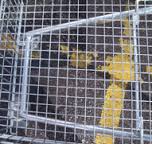As part of a larger look back at private security in yesteryear – more sophisticated than you might think – here’s the second of a three-part article on a Home Office working party on ‘internal security’ in 1973. It took evidence from retail chains still going strong today, such as Marks & Spencer, and Tesco; and provincial and independent retailers, once important names in their locality, often now long gone.
Members of the working party noted that Leak and Thorp of York did not prosecute staff who were caught stealing. Members suggested that was because the retailer feared ‘adverse effects’. Instead, staff were dismissed. In many small shops, the owner checked deliveries personally. Some replying to the Home Office said that they trusted their staff completely; or, that they only employed trustworthy staff. But, as the working party members wondered, how could such statements be justified?!
Reading chamber of commerce sent a questionnaire to 200 members, and had answers from 22. The low take-up may have been because internal theft was a sore point. When asked whether internal ‘pilferage’ caused more loss than customer shoplifting, 11 replied yes, and ten no.
Who you refrain from displaying merchandise less prominently if it meant a reduction in takings, and equally less likelihood of shoplifting? Five said yes, 17 no. In other words, of those shops that offered an opinion, most would accept the risk of theft in the hope of making more sales. Did ‘modern’ methods of retail – self-service and ‘cash and wrap’ increase shoplifting? So the Home Office asked. all 22 said yes.
Some respondents went into more detail. One reply blamed crime for a shop going out of business, and said that ‘the shop was raped by football hooligans and there was steady pilferage by all classes of people over the months – the individuals knowing I was alone in the shop for most of the time’. Other answers showed that shops knew what worked to prevent losses: such as, alert staff, and good service; or signs warning of store detectives; in other words, rather than outright security devices. Many replying to the Home Office felt that penalties for shop thefts was inadequate.
M&S enclosed its conditions of employment, and staff regulations. Staff guilty of dishonesty would be ‘summarily dismissed …. Every case of dishonesty will be considered for prosecution and no reference to prospective employers will be given’. Likewise, staff would be dismissed instantly if they smoked, other than at permitted times and places. As the staff regulations put it, a job with M&S was ‘a position of trust’.
Part three of three; click here.










